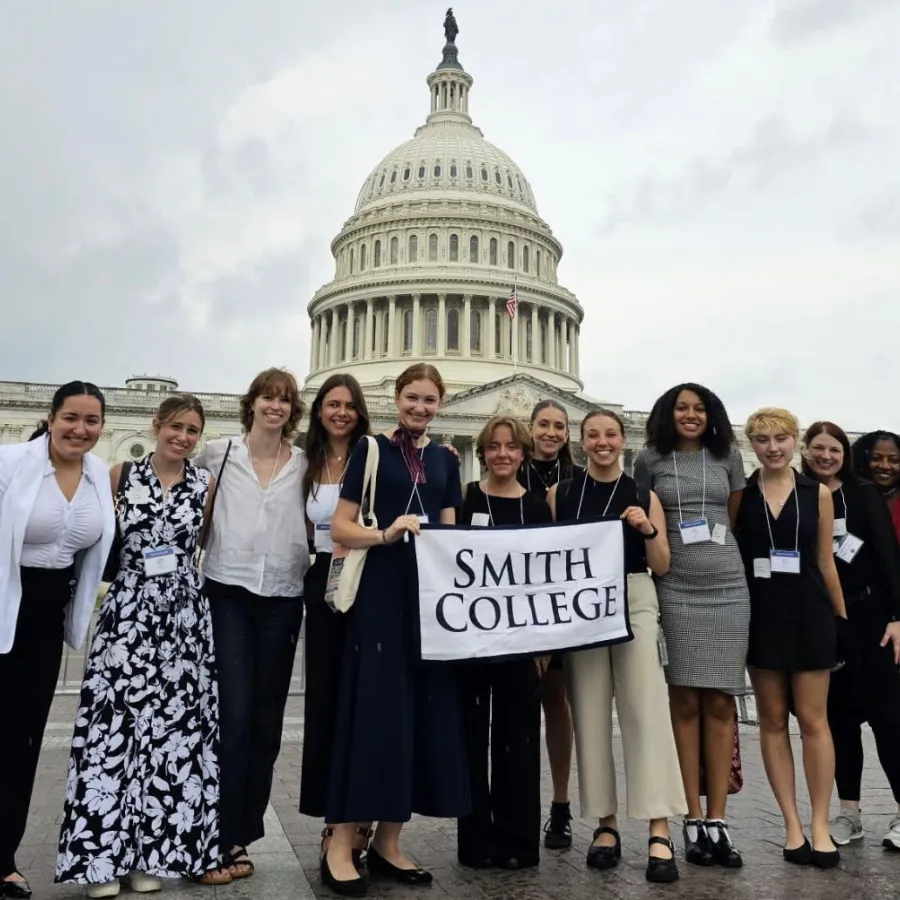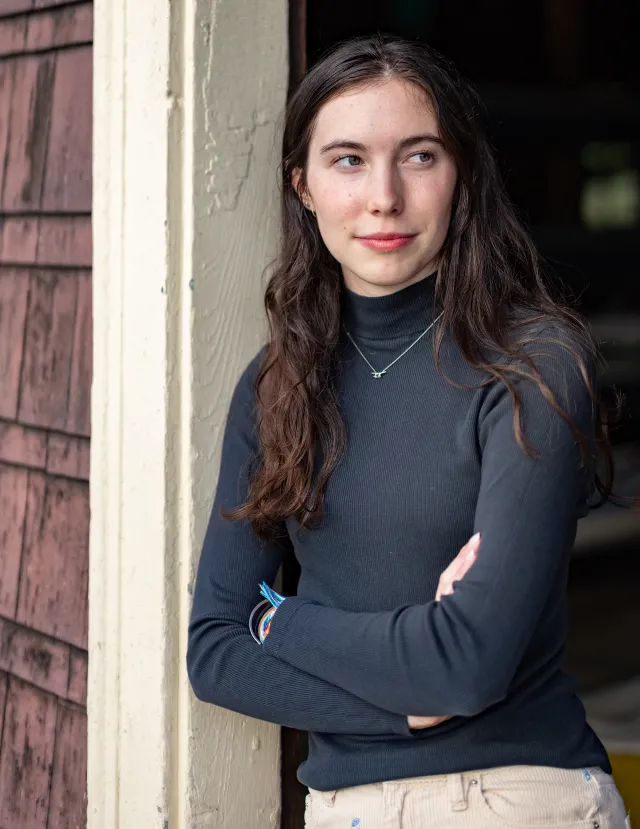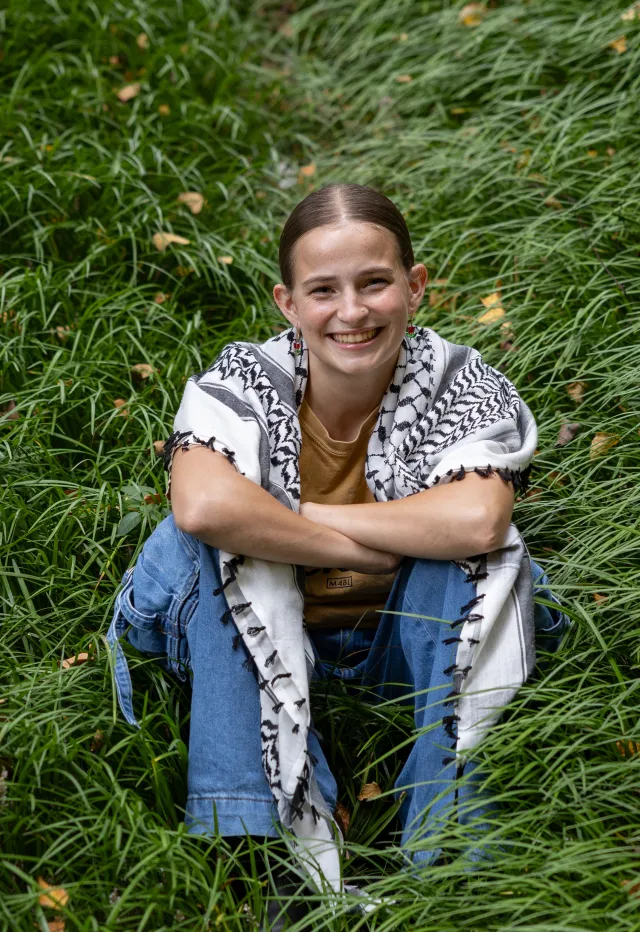Taking it to the Polls
Democracy in Action
Smith students share thoughts on voting ahead of the upcoming election
Samantha Sondik ’26 (far left) in Washington, D.C., with fellow Smithies.
Published October 8, 2024
On the first Tuesday of the month, Katie Shea ’26 plants herself outside the Campus Center Café and begins shouting through a megaphone. Her message is simple: register to vote.
As a member of the steering committee for Smith Votes, a campus-wide initiative established in 2018 to encourage Smithies to register and get out the vote, the government and history double major has spent the last few Tuesdays with the group, answering questions, offering support and encouragement, and helping her peers ensure that they’re registered to vote in the upcoming presidential election.
“There’s a big presidential election, and that’s exciting, but there’s also so many other positions up for office, and those positions are going to have huge impacts on your daily life,” Shea says. “You don’t lose anything from going out and voting, but you could gain something.”
Across campus, Smithies like Shea are gearing up for Election Day in November. Some are taking concrete action, canvassing for candidates, handing out flyers, or fundraising, while others are taking the time to discuss options with their peers and educate themselves about the candidates and various referendums on the ballot. President Sarah Willie-LeBreton considers the process of preparing to vote to be an opportunity to get to know the issues and engage with others who may hold a different perspective from your own. “Before an election is a great time to speak with people you know are supporting different candidates to get their take on things (but you really do have to speak to folks supporting candidates from different parties!),” she says. “I’m thrilled Smith Votes is encouraging everyone who can vote to exercise their right and their responsibility at the ballot box.”
A Long Time Coming
For many students, this year’s presidential election is the first in which they can vote, but their political motivations nonetheless run deep. Shea, for example, spent much of 2020 volunteering for campaigns and writing postcards to swing state voters, but she wasn’t old enough to contribute to her own efforts by casting a ballot.
“It was frustrating to do all of that and then not get to vote myself—it’s like, ‘You guys, go vote, please!’” she recalls. “So I’m really excited to be able to vote in this one.”
As a Washington, D.C., native, Vivian Pittard ’26 has had a front-row seat to the American political scene. “It’s a huge privilege of being from the city,” she says. “I went to my first protest when I was 12 [2017’s Women’s March], and I’ve kept going from there—organizing, going to more protests, leading walkouts…that continued through to college and the rest of my life.”
“I’m thrilled Smith Votes is encouraging everyone who can vote to exercise their right and their responsibility at the ballot box.”
Samantha Sondik ’26, who serves as a member of the Student Government Association, Smith Votes, and the Smith Democrats, echoes a similar sentiment, citing the Sandy Hook massacre as a defining moment in her life. “I grew up in Connecticut, and I remember even then that feeling of powerlessness that came from things happening to you instead of with you,” she says. “It made me want to be involved in a movement that actively participates in making life better for people. I didn’t think there was really any other option.”
Much of Sondik’s work in getting out the vote is done by forming connections, especially with local government officials. “I really encourage people to talk to a dedicated civil service person,” she says. “They exist, and they remind you that actually, there are a lot of people who care about what goes on in this country and making lives better for the people that they serve.”
Combating Disillusion
In preparing for their first presidential election, Smithies have also had to come to grips with the fact that while voting is undoubtedly important, there’s no guarantee you’ll see your desired outcome. “You have this idealistic notion of voting when you’re younger—at least I did—that you were going to really get to vote for someone you agreed with on every issue,” Pittard says. “You were going to get to vote for the good guys over the bad guys and it was going to be this great thing.”
If Shea ever finds herself feeling disillusioned, she reminds herself of the fact that there are other important issues in the upcoming election beyond choosing the next president. “Your board of selectmen, your state senators, those people are also going to be impacting your life, and campaigning for them is a great way to get involved,” she says. “There’s excitement there, it’s just figuring out how to get it back again.”
Pittard reminds herself that she’s casting a vote for those who can’t and don’t have a voice. “So many people in so many countries, and even in this country, don’t have the right to vote,” she says. “I’m voting for the people before me that didn’t have those rights, the people now that [still] don’t have those rights.”
Meanwhile, Sondik believes it’s her duty to vote as a way to honor those who risked their lives to secure her right to do so in the first place. “The generations of people that have fought for this right to exercise exactly what we do that day means that we have no choice but to cast that ballot,” she says. “There’s too much heritage we’ve inherited from our predecessors who fought for this for us to turn around and look the other way because it’s an uncomfortable choice. That can’t be what we do.”
“The generations of people that have fought for this right to exercise exactly what we do that day means that we have no choice but to cast that ballot.”
An International Perspective
It’s important to remember, too, that international students are watching the electoral process unfold and also have a stake in the election results, even though they can’t cast a ballot.
“I’m a bit uncertain about what the future holds, but at the same time, I’m hopeful that whatever the outcome will be, it will help support the prosperity of America itself,” says an international student from Africa, who wishes to remain anonymous. “From my own perception of elections and citizenship, at the end of the day, I just believe that this government is for the people, by the people, and that everything that happens has to align with that American ideology.”
Her plans on election night? “Oh, I’ll be watching the news like nobody’s business.”


